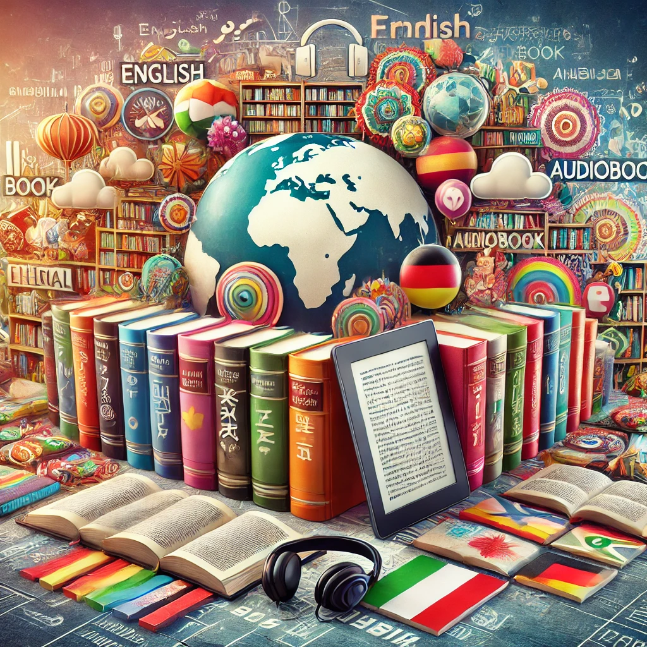Global Book Sales by Languages: An In-depth Analysis

In the multifaceted world of publishing, the language in which a book is written significantly influences its reach and sales. With the advent of globalization and the digital revolution, the landscape of book sales has transformed remarkably. This article delves into the statistics of book sales by languages worldwide, highlighting the key trends and insights.
Dominant Languages in Book Publishing
English
English remains the dominant language in global book publishing. A substantial portion of the world's literary market is English-centric, with countries like the United States, the United Kingdom, Canada, and Australia leading the way. According to the International Publishers Association (IPA), English-language books account for approximately 60% of all book sales globally. This dominance is attributed to the widespread use of English as a second language and the significant presence of English in education, media, and technology.
Mandarin Chinese
Mandarin Chinese is the second most popular language in book publishing. China's burgeoning middle class and its increasing literacy rate have propelled the growth of Mandarin book sales. The Chinese publishing industry is one of the fastest-growing markets, with annual sales reaching over $10 billion. With more than a billion native speakers, Mandarin's influence in the literary world continues to expand.
Spanish
Spanish is another major language in the global book market. Predominantly spoken in Spain, Latin America, and parts of the United States, Spanish-language books enjoy a wide readership. The Spanish book market is valued at approximately $4 billion annually. Countries like Mexico, Argentina, and Colombia are key contributors to the Spanish book publishing industry.
German
German-speaking countries, including Germany, Austria, and Switzerland, boast a robust book market. Germany, in particular, is known for its strong literary tradition and hosts the Frankfurt Book Fair, one of the largest book fairs in the world. The German book market is valued at around $9 billion, with a significant portion dedicated to academic and non-fiction publications.
French
French remains a prominent language in the publishing world, with France, Canada (specifically Quebec), Belgium, and several African countries contributing to its book sales. The French book market is estimated to be worth $5 billion annually. French literature, known for its rich history and cultural significance, continues to attract readers worldwide.
Emerging Languages in the Global Book Market
Arabic
The Arabic-speaking world is witnessing a gradual rise in book sales. With a growing population and increasing literacy rates in the Middle East and North Africa, the demand for Arabic books is on the rise. The Arabic book market is valued at approximately $1 billion annually, with significant contributions from countries like Egypt, Saudi Arabia, and the United Arab Emirates.
Hindi
India's rapid economic growth and increasing literacy rate have spurred the demand for Hindi-language books. With over 600 million speakers, Hindi is one of the most spoken languages globally. The Hindi book market is valued at around $2 billion annually, with a focus on educational and religious texts.
Portuguese
Portuguese, spoken primarily in Portugal and Brazil, is another emerging language in the book publishing industry. Brazil, with its large population and growing middle class, is a significant contributor to Portuguese book sales. The Portuguese book market is valued at approximately $1.5 billion annually.
Digital Revolution and Multilingual Publishing
The rise of digital publishing has transformed the way books are produced, distributed, and consumed. E-books and audiobooks have gained immense popularity, offering readers access to a diverse range of languages and genres. Platforms like Amazon Kindle, Audible, and Apple Books have made it easier for authors to publish and distribute their works globally, reaching readers in multiple languages.
Multilingual E-books
Multilingual e-books are becoming increasingly popular, allowing readers to switch between languages seamlessly. This trend is particularly beneficial for language learners and bilingual readers. Publishers are investing in translating popular titles into multiple languages to cater to a global audience. For more insights on this trend, explore our article on the Digital Revolution and Multilingual Publishing: The Rise of Multilingual E-books.
Audiobooks
The audiobook market has seen exponential growth, with an increasing number of titles available in various languages. Audiobooks offer a convenient way for readers to consume literature while commuting, exercising, or multitasking. This format has opened new avenues for authors and publishers to reach non-native speakers and expand their audience.
Translation Opportunities for English Books
Translating English books into other languages presents a significant opportunity for expanding reach and increasing sales. Publishers and authors can tap into new markets and connect with diverse audiences by offering translations of popular titles. For a detailed analysis and insights on translation opportunities for English books worldwide, check out our article on Translation Opportunities for English Books Worldwide: A Global Perspective.
Conclusion
The global book market is a dynamic and ever-evolving landscape, shaped by cultural, economic, and technological factors. English remains the dominant language in book sales, but other languages like Mandarin, Spanish, German, and French also hold significant market shares. Emerging languages such as Arabic, Hindi, and Portuguese are gradually making their mark in the literary world.
The digital revolution has further democratized access to literature, allowing for greater diversity and inclusion in the publishing industry. As the world becomes more interconnected, the demand for books in multiple languages will continue to grow, fostering a richer and more inclusive global literary culture.
By understanding these trends and statistics, publishers, authors, and readers can navigate the complex world of book publishing and contribute to its vibrant and diverse ecosystem.



